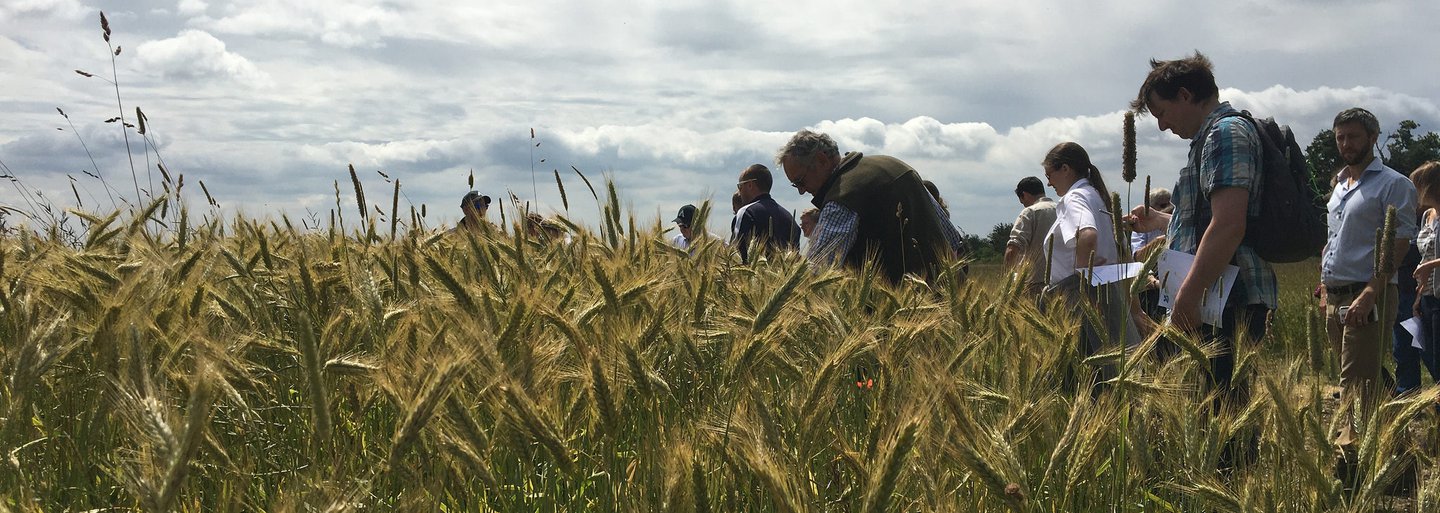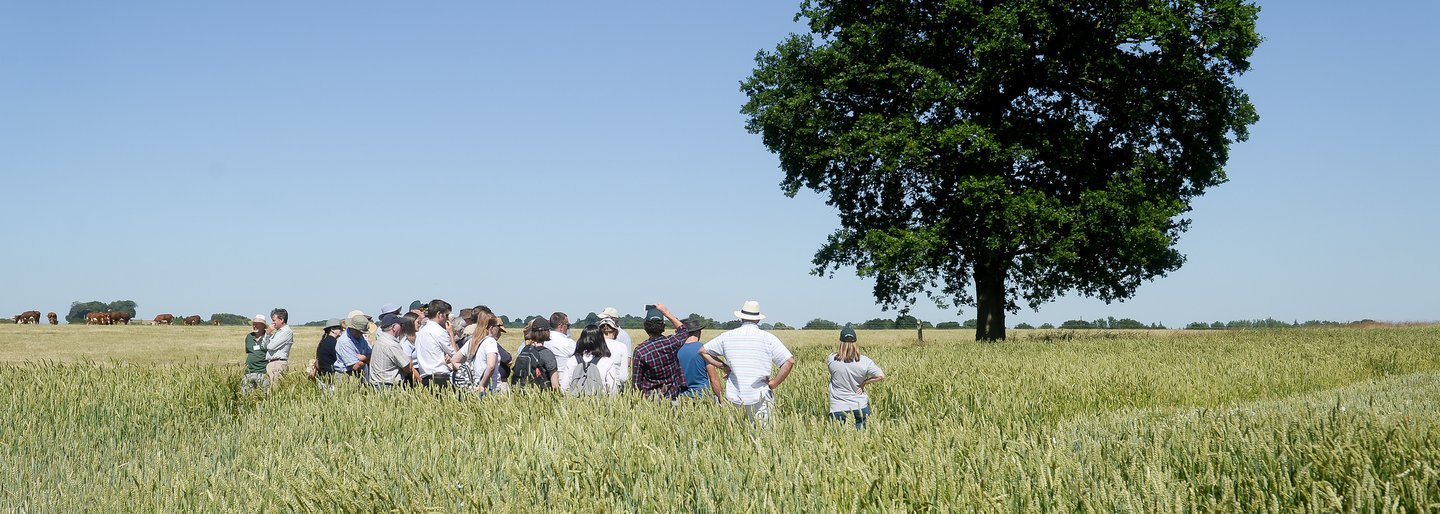
Organic Farm Management Handbook 2023
At a time where external agricultural inputs and market volatility are at a high, organic production as a solution to the transition to low input systems has never seemed more logical.
After a tumultuous few years for the food and drink market, the hope is that the latest version of the handbook will better equip organic farmers, growers, and prospective entrants with reliable market data, specific sector budgets, and sources of information and advice.
Secure a copy of the Organic Farm Management Handbook 2023

French Court of auditors declares organic represents the best value for health and the environment
On 30 June 2022 France's Court of Auditors released a report evaluating public policy support to organic farming.
After a detailed review of the scientific literature the Cour des comptes cite the benefits of organic farming, particularly in terms of health and the environment, and observes that the development of organic farming is the best way to make the agri-environmental transition successful and lead so-called conventional farms towards more environmentally friendly practices.
From the report:
The positive impact of organic farming on the environment is also well documented. While water pollution, mainly due to nitrates, phosphorus and phytosanitary products of agricultural origin, continues to worsen, organic farming can reduce it. This is why water agencies are providing increasing financial support for organic conversions: prevention is much cheaper than decontamination of drinking water.
Drinking water companies such as that in Paris have started to finance organic farming in catchment areas.
Organic farming has a positive impact on air quality, which is comparatively degraded by ammonia emissions from nitrogen fertilisers used in conventional farming.
Organic farming makes a strong contribution to the preservation of biodiversity, with fauna and flora species being on average 30% more numerous and their populations 50% more abundant in organic crops, whereas populations of field birds and pollinators have decreased by more than 30% since 1990 in Europe.
This form of agriculture emits less greenhouse gases per hectare, particularly nitrous oxide, because mineral nitrogen fertilisers are not used, as well as at the farm level, where organic farming seeks autonomy.

The improvement of animal welfare in organic farming is based on its specifications, which prohibit cages and tethered animals, limit stocking densities, prescribe a more natural diet (fodder, mother's milk) and guarantee access to the open air.
Finally, the development of organic farming has a favourable impact on employment in rural areas due to its attractiveness for young farmers: one third of installations are now organic. This production system, which uses more labour, creates jobs in agriculture, as well as in the organic sector.
To help achieve these objectives, the Court concludes this evaluation with 12 recommendations, grouped into three main guidelines:
Recommendations
Guideline 1: Inform citizens and consumers about the environmental and health impact of the organic farming sector
Guideline 3: promote the creation of value within the organic farming sector
Guideline 2: redirect public support for agriculture to the organic sector
—
Read the full report from France's Court of Auditors -
Support for organic farming
___________________________________________
___________________________________________
Organic: the benchmark for truly regenerative farming
There is a new ‘buzz word’ being championed by numerous industry stakeholders and influencers – regenerative agriculture.
Regenerative agriculture seeks to capture atmospheric carbon dioxide by growing plants that move carbon dioxide into the soil mostly through ‘no-till” and/or "reduced till" practices and permanent perennial pastures and grasslands.
There are several individuals, groups, and organizations that have attempted to define the principles of regenerative agriculture. In their review of the existing literature on regenerative agriculture, researchers at Wageningen University created a database of 279 published research articles on regenerative agriculture.
Their analysis of this database found that people using the term regenerative agriculture were using different principles and practises to guide their interpretation.
While there are some excellent regenerative initiatives, the lack of clarity around a regenerative approach is worrying.
It means potentially hazardous synthetic fertilisers, harmful synthetic biocides, and genetically modified or engineered crops with potential risks to ecosystems and to rural economies may all be used. Furthermore, animal welfare may not always be prioritised. In sharp contrast, organic’s legally binding production standards already clearly enshrines the best of regenerative agriculture’s principles.
Over seventy years organic production has focused on strengthening the health of soils; increasing biodiversity; improving the water cycle; and increasing resilience to climate change. Organic farming continues to reconnect humans with nature’s rhythms and ecosystems and has regenerated natural landscapes while providing us with nutritious food.
OF&G believe in the need for a holistic and multi-dimensional approach to soil health and biodiversity enhancement.
Organic focuses not only on the amount of carbon stored in soils, but also on biodiversity protection, which requires a systemic transition of the farming system.

______________________________________________________________________________

Organic producers already undertake regenerative practices, day in day out as they implement a clear and legally binding organic production standard. Organic farmers and businesses within the supply chain are annually audited for compliance. OF&G believe that there is no appetite or need to add to the regulatory burden with additional substantiation of so-called regenerative methods.
In the UK, organic farming is truly regenerative. OF&G believe the organic sector should communicate the already substantiated regenerative nature of organic production more openly and effectively.
This is not simply hubris: organic management shows a proven positive impact on soil-based greenhouse gas emissions and soil health. On average the climate protection performance of organic results in 1082 kg CO2 equivalent per hectare per year, due to lower GHG emissions and increased carbon sequestration in soils.
This is the outcome of the organic ‘regenerative’ principles and practises detailed in organic standards.
Download the full document
for more detail
______________________________________________________________________________
Sustainable Farming Incentive opens for applications
The Sustainable Farming Incentive opened for applications in England 30 June 2022
The scheme is available to all farmers who currently receive Basic Payment Scheme (BPS) payments, designed to be accessible, and will reward sustainable practices which support food production and benefit the environment.

Defra is opening the scheme in a controlled rollout from 30 June to manage the opening in a careful, measured way: for those with no other agri-environment agreements, they’ll be able to apply online straight away; for everyone else, they’ll be asked to let the Rural Payment Agency (RPA) know they want to apply and RPA will get in touch and support them to do so. This is to ensure everyone receives the right level of service and support during this initial phase of rollout.
OF&G Staff Contact Details

In response to current Government advice that everyone who can work from home should do, the majority of our staff are working remotely.
We would like to reiterate however that there should be no disruption in our services, with the team being available as usual Monday-Friday 9am– 5pm.
To help ensure you can contact the relevant person effectively please look at the OF&G staff contact details
______________________________________________________________________________
Classified adverts
For sale
-
Organic Oats rolled or whole
We have either rolled or organic oats for sale
ViewMiles walton
6 days ago
Wanted
-
Wanted dairy cows
30-40 heifers or young cows. Must be small high solids grazing type. Suitable for OAD all grass system. Preferably freshly calved or calving up to mid April
ViewMatthew Boley
Added today

Online wellbeing support and counselling for farming people
In partnership with RABI, you can access free, safe and anonymous online mental wellbeing support from any device.
Hear what farming people like you have to say about mental health and wellbeing.
______________________________________________________________________________
Organic Farmers and Growers (OF&G) is a Community Interest Company with more than forty years experience in the organic sector.
-
Speak to our team
The OF&G organic certification team understands business and what it’s like to operate in the sector.
Speak to the team -
Useful information
The OF&G website hosts a wealth of organic and other related technical documents, information packs and forms.
Download documents -
Hear from our licensees
Read testimonials and watch videos giving real life examples of our customers and how we help them.
What licensees say -
More about us
OF&G has more than forty years experience in the organic sector and is the longest-established Defra approved control body.
About OF&G
Useful information
-
Technical leaflets (TLs) & more
We host a wealth of organic certification-related technical documents, information packs and forms which you may download for free from the OF&G website.
Search leaflets & papers -
Certified producers
Access the bioC directory of approximately 70,000 Certified Organic Operators to verify up to date certificate information and other company details.
Find a certified producer -
Approved Inputs
Search for Approved Inputs by type, company or product. Select any business to see further contact details, such as address, telephone and website.
Find out more
Enter content...


